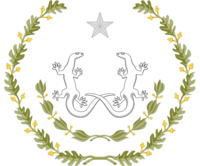Foreign relations of Anáhuac: Difference between revisions
mNo edit summary |
|||
| (2 intermediate revisions by the same user not shown) | |||
| Line 2: | Line 2: | ||
{{Region icon Anteria}} | {{Region icon Anteria}} | ||
{{Politics of Anáhuac}} | {{Politics of Anáhuac}} | ||
The '''foreign relations of Anáhuac''' are directed by the President of the Republic and managed through the Ministry of Foreign Affairs. | The '''foreign relations of Anáhuac''' are directed by the [[President of Anáhuac|President of the Republic]] and managed through the [[Ministry of Foreign Affairs (Anáhuac)|Ministry of Foreign Affairs]]. Foreign policy and its principles are constitutionally recognized in the Article 89, Section 10, which include: | ||
{{wp|International law|international law}} and {{wp|Sovereign state|legal equality of states}}, their {{wp|Sovereignty|sovereignty}} and {{wp|Independence|independence}}, {{wp|Non-intervention|non-intervention}} in the domestic affairs of other countries, {{wp|Dispute resolution|peaceful resolution of conflicts}}, and promotion of {{wp|International security|collective security}} through active participation in {{wp|International organizations|international organizations}}. Until its abolition in 2023, the [[Khan Doctrine]] has served as a crucial complement to these principles. | |||
While it can be disputed whether or not Anáhauc is a regional power in Olivacia, its foreign policy was built under hemispheric prestige in subsequent decades of its independence. In 2003, former President Samara Mireles adopted a new foreign policy that called for an openness and an acceptance of criticism from the international community and the increase of Anahuacan involvement in foreign affairs, as well as a further integration towards its northern and southern neighbors. A greater priority to Olivacia was given under President Moctezuma Ortega. | |||
Anáhuac is one of the founding members of several international organizations, most notably the [[Saltstil Pact]] and the [[PENA|Petrol Exporting Nations Association]]. Anáhuac is often classified as a newly industrialized country, a regional power in Olivacia and an emerging market. | |||
[[File:Bilateral Relations of Anáhuac.png|300px|thumb|Nations with which Anáhuac has diplomatic relations.]] | [[File:Bilateral Relations of Anáhuac.png|300px|thumb|Nations with which Anáhuac has diplomatic relations.]] | ||
== Foreign policy == | |||
== Diplomatic relations == | |||
== Bilateral relations == | |||
=== [[Olivacia]] === | |||
{| class="wikitable sortable" style="width:100%; margin:auto;" | |||
|- | |||
! style="width:15%;"| Country | |||
! style="width:15%;"| Formal relations began | |||
! style="width:15%;"| Ambassadors | |||
!Notes | |||
|- valign="top" | |||
|} | |||
=== [[Thrismari]] === | |||
{| class="wikitable sortable" style="width:100%; margin:auto;" | |||
|- | |||
! style="width:15%;"| Country | |||
! style="width:15%;"| Formal relations began | |||
! style="width:15%;"| Ambassadors | |||
!Notes | |||
|- valign="top" | |||
|} | |||
=== [[Thuadia]] === | |||
{| class="wikitable sortable" style="width:100%; margin:auto;" | |||
|- | |||
! style="width:15%;"| Country | |||
! style="width:15%;"| Formal relations began | |||
! style="width:15%;"| Ambassadors | |||
!Notes | |||
|- valign="top" | |||
|} | |||
=== [[Hirethia]] === | |||
{| class="wikitable sortable" style="width:100%; margin:auto;" | |||
|- | |||
! style="width:15%;"| Country | |||
! style="width:15%;"| Formal relations began | |||
! style="width:15%;"| Ambassadors | |||
!Notes | |||
|- valign="top" | |||
|} | |||
=== [[Meredonne]] === | |||
{| class="wikitable sortable" style="width:100%; margin:auto;" | |||
|- | |||
! style="width:15%;"| Country | |||
! style="width:15%;"| Formal relations began | |||
! style="width:15%;"| Ambassadors | |||
!Notes | |||
|- valign="top" | |||
|} | |||
=== [[Caleren]] === | |||
{| class="wikitable sortable" style="width:100%; margin:auto;" | |||
|- | |||
! style="width:15%;"| Country | |||
! style="width:15%;"| Formal relations began | |||
! style="width:15%;"| Ambassadors | |||
!Notes | |||
|- valign="top" | |||
|} | |||
== Transnational issues == | |||
== See also == | |||
[[Category:Anáhuac]] | [[Category:Anáhuac]] | ||
Latest revision as of 09:54, 16 May 2023
This article is incomplete because it is pending further input from participants, or it is a work-in-progress by one author. Please comment on this article's talk page to share your input, comments and questions. Note: To contribute to this article, you may need to seek help from the author(s) of this page. |
 |
|---|
| This article is part of a series on the politics and government of Anáhuac |
The foreign relations of Anáhuac are directed by the President of the Republic and managed through the Ministry of Foreign Affairs. Foreign policy and its principles are constitutionally recognized in the Article 89, Section 10, which include: international law and legal equality of states, their sovereignty and independence, non-intervention in the domestic affairs of other countries, peaceful resolution of conflicts, and promotion of collective security through active participation in international organizations. Until its abolition in 2023, the Khan Doctrine has served as a crucial complement to these principles.
While it can be disputed whether or not Anáhauc is a regional power in Olivacia, its foreign policy was built under hemispheric prestige in subsequent decades of its independence. In 2003, former President Samara Mireles adopted a new foreign policy that called for an openness and an acceptance of criticism from the international community and the increase of Anahuacan involvement in foreign affairs, as well as a further integration towards its northern and southern neighbors. A greater priority to Olivacia was given under President Moctezuma Ortega.
Anáhuac is one of the founding members of several international organizations, most notably the Saltstil Pact and the Petrol Exporting Nations Association. Anáhuac is often classified as a newly industrialized country, a regional power in Olivacia and an emerging market.
Foreign policy
Diplomatic relations
Bilateral relations
Olivacia
| Country | Formal relations began | Ambassadors | Notes |
|---|
Thrismari
| Country | Formal relations began | Ambassadors | Notes |
|---|
Thuadia
| Country | Formal relations began | Ambassadors | Notes |
|---|
Hirethia
| Country | Formal relations began | Ambassadors | Notes |
|---|
Meredonne
| Country | Formal relations began | Ambassadors | Notes |
|---|
Caleren
| Country | Formal relations began | Ambassadors | Notes |
|---|
